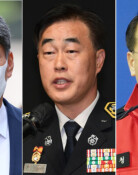Why does N. Korea start badmouthing U.S.?
Why does N. Korea start badmouthing U.S.?
Posted March. 15, 2001 11:40,
Apparently upset at expressions of Washington`s hardened North Korea policy stance during the South Korea-U.S. summit, Pyongyang began assailing the United States in earnest Wednesday using its official broadcasting network.
Prior to Mar. 8, when the results of the Washington summit became known in Pyongyang, North Korea had taken issue with a U.S. State Department human rights report and its labeling of Pyongyang as a sponsor of terrorism.
On that day, North Korea stepped up its anti-U.S. rhetoric, broadcasting accusatory messages as often as six times an hour and lashing out at U.S. President George W. Bush for his promotion of a national missile defense system and moves to strengthen America`s alliance with Japan. A Korean government official predicted that relations between the U.S. and North Korea would remain strained for some time.
Between Mar. 9 and 13, Pyongyang referred to the United States 40 times as ``American imperialists,`` a highly derogatory appellation North Koreans had refrained from using in recent years. While describing South Korea as subservient to the United States, Pyongyang called for ``cooperation among compatriots`` to implement the June 15 joint statement, obviously seeking to separate Seoul-Pyongyang ties from Washington-Pyongyang relations.
Cho Myong-Cheol, researcher at the Korea Institute for International Economic Policy and a defector from North Korea, said Pyongyang`s leadership seems to have developed a much more intense distrust of Washington than the skepticism expressed by President Bush at the Washington summit. North Koreans might have a strong suspicion that the United States is trying to overthrow the communist regime in Pyongyang, he said.
``As North Korea becomes more sensitive to a presumed threat to its security from the United States, its reaction is likely to grow stronger, making detente and dialogue between Washington and Pyongyang more difficult,`` he said.
The general consensus, however, is that North Korea`s denunciation of the United States is not meant to totally undermine their bilateral relationship. As an example, North Korea analysts cited a message broadcast by North Korea`s Central TV on Tuesday, calling on some conservative elements in the United States to abandon their hostile attitude toward North Korea now that many nations are reaching out to improve ties with Pyongyang.
Ex-Vice Minister of Unification Jeong Se-Hyeon termed the current state of U.S.-North Korea relations as ``a cold but transient interlude that heralds a season of blooming.`` As the United States is measuring the signs of change in North Korea, so is North Korea in the process of testing the waters in and around the United States, he said. Jeong went on to stress the importance of the Seoul government`s role as a mediator.
Ha Tae-Won scooop@donga.com







